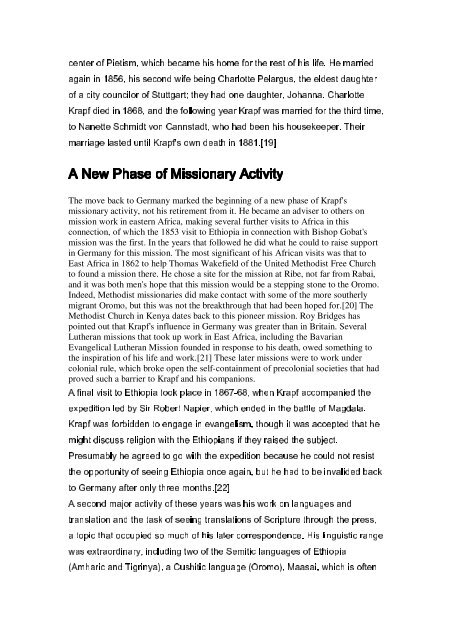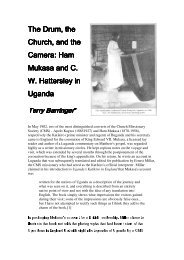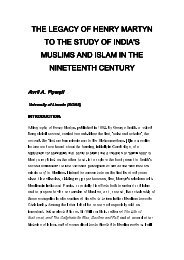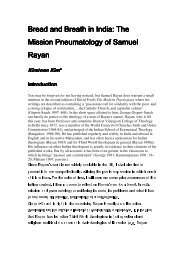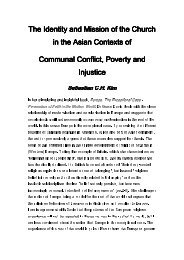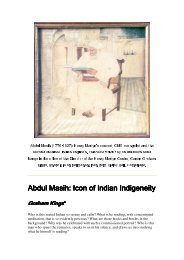The Legacy of Johann Ludwig Krapf - Henry Martyn Centre
The Legacy of Johann Ludwig Krapf - Henry Martyn Centre
The Legacy of Johann Ludwig Krapf - Henry Martyn Centre
You also want an ePaper? Increase the reach of your titles
YUMPU automatically turns print PDFs into web optimized ePapers that Google loves.
<strong>The</strong> move back to Germany marked the beginning <strong>of</strong> a new phase <strong>of</strong> <strong>Krapf</strong>'s<br />
missionary activity, not his retirement from it. He became an adviser to others on<br />
mission work in eastern Africa, making several further visits to Africa in this<br />
connection, <strong>of</strong> which the 1853 visit to Ethiopia in connection with Bishop Gobat's<br />
mission was the first. In the years that followed he did what he could to raise support<br />
in Germany for this mission. <strong>The</strong> most significant <strong>of</strong> his African visits was that to<br />
East Africa in 1862 to help Thomas Wakefield <strong>of</strong> the United Methodist Free Church<br />
to found a mission there. He chose a site for the mission at Ribe, not far from Rabai,<br />
and it was both men's hope that this mission would be a stepping stone to the Oromo.<br />
Indeed, Methodist missionaries did make contact with some <strong>of</strong> the more southerly<br />
migrant Oromo, but this was not the breakthrough that had been hoped for.[20] <strong>The</strong><br />
Methodist Church in Kenya dates back to this pioneer mission. Roy Bridges has<br />
pointed out that <strong>Krapf</strong>'s influence in Germany was greater than in Britain. Several<br />
Lutheran missions that took up work in East Africa, including the Bavarian<br />
Evangelical Lutheran Mission founded in response to his death, owed something to<br />
the inspiration <strong>of</strong> his life and work.[21] <strong>The</strong>se later missions were to work under<br />
colonial rule, which broke open the self-containment <strong>of</strong> precolonial societies that had<br />
proved such a barrier to <strong>Krapf</strong> and his companions.<br />
A New Phase <strong>of</strong> Missionary Activity<br />
place in 1867-68, when <strong>Krapf</strong> accompanied the expedition led by Sir Robert Napier, which ended in the battle <strong>of</strong> Magdala. took Ethiopia to visit final A<br />
<strong>of</strong> Pietism, which became his home for the rest <strong>of</strong> his life. He married again in 1856, his second wife being Charlotte Pelargus, the eldest daughter <strong>of</strong> a city councilor <strong>of</strong> Stuttgart; they had one daughter, <strong>Johann</strong>a. Charlotte <strong>Krapf</strong> died in 1868, and the following year <strong>Krapf</strong> was married for the third time, to Nanette Schmidt von Cannstadt, who had been his housekeeper. <strong>The</strong>ir center<br />
lasted until <strong>Krapf</strong>'s own death in 1881.[19] A New Phase <strong>of</strong> Missionary Activity A New Phase <strong>of</strong> Missionary Activity A New Phase <strong>of</strong> Missionary Activity marriage<br />
was forbidden to engage in evangelism, though it was accepted that he might discuss religion with the Ethiopians if they raised the subject. Presumably he agreed to go with the expedition because he could not resist the opportunity <strong>of</strong> seeing Ethiopia once again, but he had to be invalided back to Germany after only three months.[22] <strong>Krapf</strong><br />
second major activity <strong>of</strong> these years was his work on languages and translation and the task <strong>of</strong> seeing translations <strong>of</strong> Scripture through the press, a topic that occupied so much <strong>of</strong> his later correspondence. His linguistic range was extraordinary, including two <strong>of</strong> the Semitic languages <strong>of</strong> Ethiopia (Amharic and Tigrinya), a Cushitic language (Oromo), Maasai, which is <strong>of</strong>ten<br />
A


